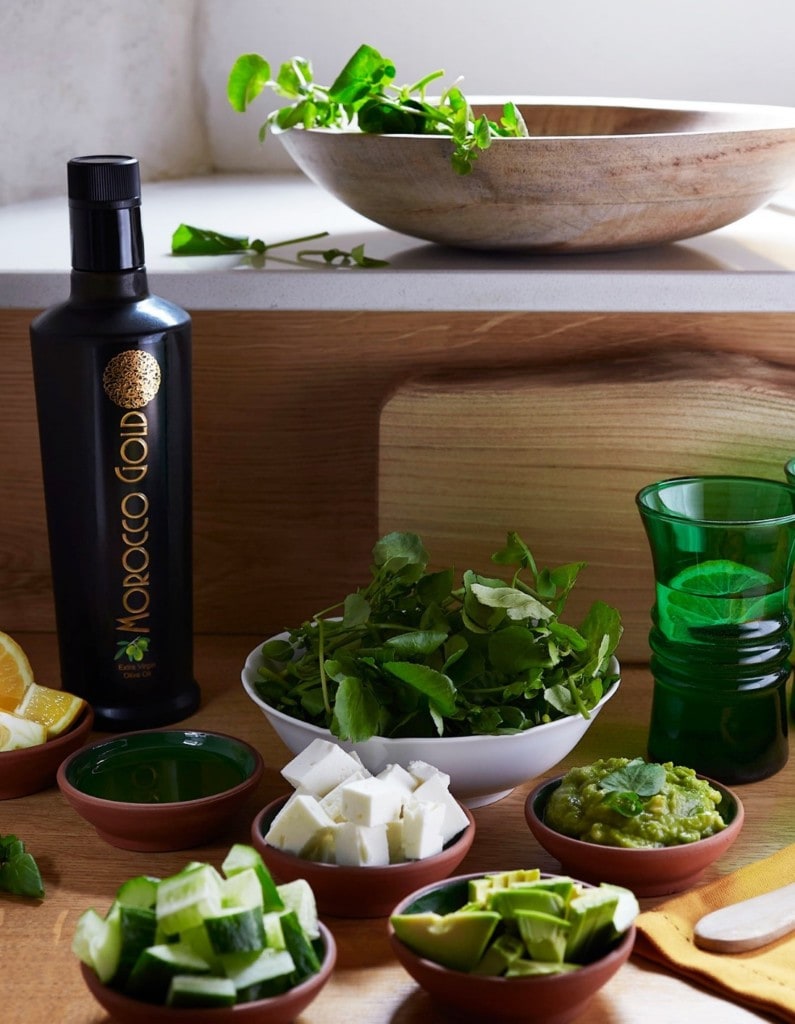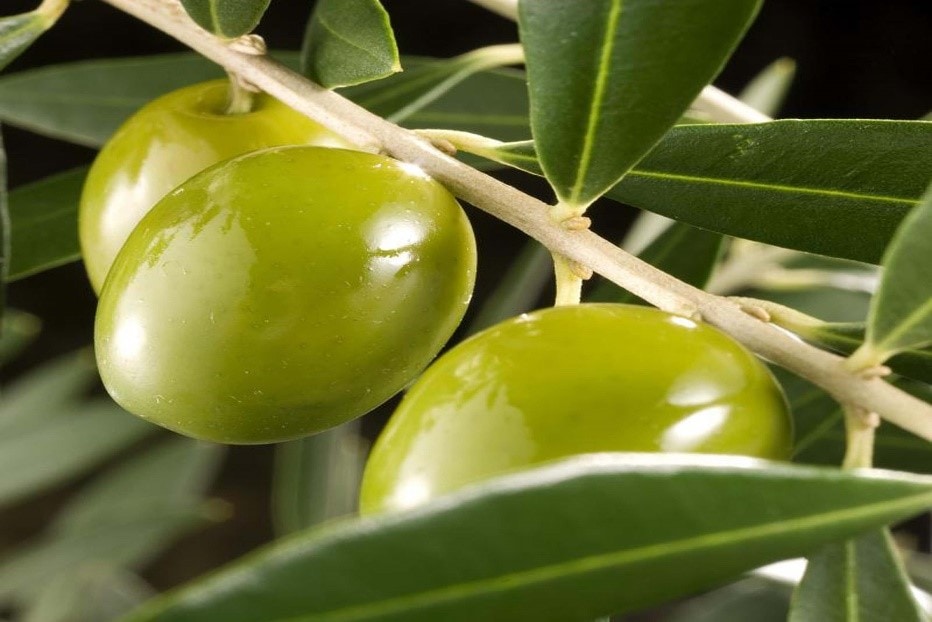Culinary Experts Endorse Encourage In US Dietary Habits
Updated April 7th 2025

Summary
- The International Olive Council and the Culinary Institute of America Endorse Extra Virgin Olive Oil As Key In Mediterranean Diet
- Extra virgin olive oil backed by experts for numerous health benefits and sustainability
- Morocco Gold exemplifies natural, sustainable agricultural methods, producing high quality extra virgin olive oil for centuries to come.
Contents
Top Culinary Bodies Endorse Extra Virgin Olive Oil As Key In Mediterranean Diet
When it comes to elevating dishes and maintaining a health-forward lifestyle, extra virgin olive oil (EVOO) has earned a rightful place in the spotlight. Esteemed culinary experts and health professionals alike champion its use as a fundamental component of nutritious and flavourful cooking. From its essential role in the Mediterranean diet to its significance in plant-based living, extra virgin olive oil offers a powerhouse of benefits that go beyond the kitchen.
This post dives into why culinary experts enthusiastically endorse extra virgin olive oil, its broader implications for sustainable eating, and how premium options like Morocco Gold Extra Virgin Olive Oil align with these values.
A key collaboration between The International Olive Council and the Culinary Institute of America will aim to highlight the importance of extra virgin olive oil as a key component of the Mediterranean diet.
As reported in the Olive Oil Times, the two influential organizations will work together to raise awareness of the benefits of extra virgin olive oil as part of a plant based diet.
The initiative, which also involves the Menus of Change University Research Collaborative will include the launch of a digital media campaign entitled ‘Olive Oil and the Plant-Forward Kitchen’.
Abundant scientific evidence indicates that shifting to a more plant-forward diet will help reduce greenhouse gas emissions from food production, mitigate climate change and cut water usage.
The Culinary Institute of America
It is understood that the campaign will be partly based on the 2019 white paper published by the IOC and CIA which set out a number of strategies to promote the consumption of extra virgin olive oil and a plant-based diet.
The messaging around the campaign will focus on raising awareness among both consumers and the hospitality industry of how to intertwine olive oil into culinary habits across the USA, including plant-forward cooking and influencing menu trends in American cooking.
This may, for example, include encouraging chefs to make sauces derived from plants instead of meat and some of the best spices and aromatics to add flavour to olive-oil based sauces.
The CIA told The Olive Oil Times; “Abundant scientific evidence indicates that shifting to a more plant-forward diet will help reduce greenhouse gas emissions from food production, mitigate climate change and cut water usage.”
Praised as one of the healthiest diets in the world, the Mediterranean diet owes much of its benefit to extra virgin olive oil, a central staple. Countries like Greece, Morocco, Spain, and Italy have long incorporated EVOO into their culinary traditions, and its benefits are backed by notable research and leading health organizations.
Extra Virgin Olive Oil Is Key to Heart Health
Studies consistently show that extra virgin olive oil supports heart health. Rich in monounsaturated fats and potent antioxidants like polyphenols, EVOO has been linked to reducing “bad” LDL cholesterol and maintaining healthy blood pressure levels. The American Heart Association even notes that replacing saturated fats (such as butter) with olive oil can reduce the risk of cardiovascular diseases.
Olive Oil Is Packed with Antioxidants
Unlike regular or light olive oil, extra virgin olive oil is cold-pressed, preserving its nutrients and rich supply of antioxidants. These antioxidants, including vitamin E and polyphenols, not only reduce inflammation but also combat free radicals, protecting cells from damage. For culinary experts, this nutritional powerhouse makes EVOO the perfect ingredient to elevate both flavor and health value in any dish.
Enhancing Flavors While Staying Nutritious
Extra virgin olive oil offers a richness that complements a variety of foods, from fresh salads to grilled vegetables and even baked goods. Its peppery undertones and fruity aroma make it a favorite among chefs for finishing dishes with a luxurious touch. Simply put, EVOO enhances taste without compromising nutrition, a dream combination for those crafting flavorful yet healthful meals.
Elevating Plant-Based Diets with Extra Virgin Olive Oil
With plant-based diets gaining traction globally, replacing animal-based fats with plant-derived oils has become a key focus. Here, extra virgin olive oil shines as a go-to alternative for those seeking to build meals rich in nutrients yet light on the planet.
Olive Oil Is A Vegan-Friendly Source of Healthy Fats
Plant-based eaters often emphasize the importance of healthy fats to maintain nutritional balance, particularly for omega-3s and omega-6s. Extra virgin olive oil provides just that, without introducing trans fats or cholesterol commonly found in animal-derived fats such as lard or butter. It’s the ideal ingredient in everything from plant-based dressings to sautéed vegetables.
Extra Virgin Olive Oil Supports Weight Management
For many, the misconception that fats lead to weight gain has kept them from fully reaping the benefits of extra virgin olive oil. However, EVOO includes fats that help regulate appetite and satiety. Studies show that its inclusion in meals can even aid in maintaining or achieving a healthy weight when incorporated into a balanced diet.
Culinary Versatility for Plant-Based Meals
From creamy hummus drizzled with olive oil to roasted vegetables dressed in garlicky goodness, EVOO offers versatile ways to add depth and variety to predominantly plant-based dishes. It’s the ultimate ally for home cooks and professional chefs alike who want to inject richness and flavor into their vegan or vegetarian creations.
Among the numerous options in the market, Morocco Gold Extra Virgin Olive Oil has emerged as a shining example of what premium, sustainable EVOO should be. Sourced from the fertile richness of Morocco, this brand places equal importance on producing high-quality olive oil and minimizing environmental impact.
Comes with Exceptional Taste and Quality
Harvested with care and packed with flavor, Morocco Gold Extra Virgin Olive Oil is cold-pressed for superior taste and nutritional benefits. The process locks in antioxidants, polyphenols, and that signature fruity aroma, making it a go-to choice for health-conscious foodies and culinary creators worldwide.
Extra Virgin Olive Oil Is Crucial Component Of Plant Based Diets

Quality extra virgin olive oils such as Morocco Gold are known to play a vital role in plant-based diet choices – which are growing in popularity globally.
A new study as added weight to the belief that opting for a plant-based diet – with low-saturated fat – can reduce your risk of coronary heart disease and stroke.
The research, conducted by The University of Minnesota, followed more than 4,700 people over 30 years, found that a plant-centred diet was associated with a lower long-term risk for cardiovascular disease than simply relying on a traditional ‘low-fat’ diet.
To remain healthy, we need moderate amounts of the right type of fats eaten as part of a good, balanced diet. However, a high fat intake and in particular, a high intake of saturated fats is associated with raised blood cholesterol and coronary heart disease.
“Since 1980, dietary guidelines in the United States and in Europe have recommended eating low amounts of saturated fat because of the high rates of heart disease in these regions. This is not necessarily wrong, but our study shows that plant-centered diets can also lower bad cholesterol and may be even better at addressing heart disease risk.”
David Jacobs, PhD, from the University of Minnesota.
As reported in Webmd.com, researchers conducted three detailed diet history interviews over the follow-up period and then calculated scores for each using the A Priori Diet Quality Score (APDQS). Higher APDQS scores were associated with higher intake of nutritionally rich plant foods and less high-fat meats. While those who consumed less saturated fats and plant-centered diets had lower low-density lipoprotein (LDL) levels, or lower levels of “bad” cholesterol, only the latter diet was also associated with a lower risk of heart disease and stroke over the long term.
Morocco Gold Extra Virgin Olive Oil And Sustainability

We at Morocco Gold extra virgin olive oil are passionately committed to strengthening a sustainable UK-Morocco Business partnership. We recently became members of the Scottish African Business Association (SABA) to learn more about the tremendous business opportunities opening up between Scotland and Africa.
Morocco Gold exemplifies natural, sustainable agricultural methods. With new olive trees planted annually, this remarkable valley will be producing high quality extra virgin olive oil for centuries to come. This extensive tree planting is also good for the environment and sustainable in the long term.
Even the packaging aligns with eco-conscious values. Morocco Gold uses recyclable materials, ensuring that their olive oil isn’t just a treat for your body, but also kind to the earth.
Among the numerous options in the market, Morocco Gold Extra Virgin Olive Oil has emerged as a shining example of what premium, sustainable EVOO should be. Sourced from the fertile richness of Morocco, this brand places equal importance on producing high-quality olive oil and minimizing environmental impact.
A Commitment to Ethical Sourcing
Morocco Gold prioritizes sustainability at every level of production. Its olive groves are carefully managed using traditional agricultural practices that honour the environment while ensuring a top-tier product. This not only preserves Morocco’s rich heritage but also ensures the soil remains fertile for generations to come.
Single-Origin Assurance
Unlike many mass-market olive oils, Morocco Gold is single-origin, meaning every bottle comes from a single designated location. This guarantees consistent quality while allowing consumers to trace the roots of their oil, promoting trust and transparency.
A recent study by researchers from the University of Oxford and the University of Minnesota demonstrated that foods which are considered to be healthy, such as whole-grain cereals, fruits, vegetables, legumes, nuts, and olive oil, also have the lowest environmental impact. The researchers found that “while there is substantial variation in the health outcomes of different foods, foods associated with a larger reduction in disease risk for one health outcome are often associated with larger reductions in disease risk for other health outcomes. Likewise, foods with lower impacts on one metric of environmental harm tend to have lower impacts on others”.
Additionally, of the foods associated with improved health (whole grain cereals, fruits, vegetables, legumes, nuts, olive oil, and fish), all except fish have among the lowest environmental impacts.
This extensive research by Michael A Clark, Marco Springmann, Jason Hill, and David Tilman, published in the journal Proceedings of the National Academy of Sciences (PNAS) shows that eating healthier also means eating more sustainably and reveals a clear link between healthy food and environmental sustainability.
For those ready to take their cooking to the next level, consider premium options like Morocco Gold Extra Virgin Olive Oil. Not only will it elevate your meals with unparalleled quality and taste, but it also aligns with values of sustainability and ethical sourcing, making every drop meaningful.
Are you ready to start cooking smarter and healthier? Explore how Morocco Gold Extra Virgin Olive Oil can transform your culinary experience.
